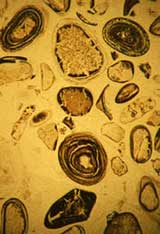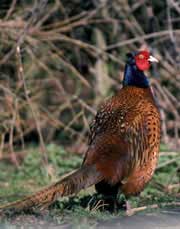Articles and reports from the Life Sciences and chemistry area deal with applied and basic research into modern biology, chemistry and human medicine.
Valuable information can be found on a range of life sciences fields including bacteriology, biochemistry, bionics, bioinformatics, biophysics, biotechnology, genetics, geobotany, human biology, marine biology, microbiology, molecular biology, cellular biology, zoology, bioinorganic chemistry, microchemistry and environmental chemistry.

Ethical considerations aside, a major issue in cloning is whether or not clones are as healthy as normally conceived animals. The evidence so far has been mixed. Some cloned cows have received clean bills of health, but Dolly suffers from premature arthritis, and many cloned animals are obese. According to a report published online today by the journal Nature Genetics, mice cloned from somatic cells fare particularly poorly. Indeed, the study found that cloned mice had significantly shorter life span

New skin receptor is the tip of the iceberg.
A snowball in the face or a chilly breeze around the ankles opens a molecular trap door in our skin’s nerve cells, two studies now show 1 , 2 . A third suggests that this, the first cold sensor to be identified, is just the tip of the iceberg 3 .
How sensory neurons detect a drop in temperature is very hard to study because it affects so many cell processes.
David Julius of

The information in DNA can be copied into new molecules without proteins’ help.
Chemists have reproduced the basic process of information transfer central to all life without the catalysts that facilitate it in living cells 1 .
They show that DNA alone can pass its message on to subsequent generations. Many researchers believe that DNA-like molecules acted thus to get life started about four billion years ago – before catalytic proteins existed to help DNA t

GENOPIA Biomedical LLC (GENOPIA), a biotechnology firm headquartered in Saarbücken, Germany and Ciphergen Biosystems, Inc. (Nasdaq: CIPH) in Fremont, CA, will collaborate on the discovery and the development of new drug targets and candidates for CNS diseases. GENOPIA Biomedical focuses on the development of novel drug candidates and uses advanced proteomics as its main drug discovery and high-throughput screening tool, while Ciphergen Biosystems is a world leader in the development of proteomics te

The coral reefs of New Caledonia, a major focus of marine biodiversity, are exceptional as subjects for investigation by zoologists and ecologists. They harbour an extraordinary profusion of species, representing one of the most complex ecosystems in the world’s oceans. Exploration of a single bay, during the Lifou 2000 research campaign, found a treasure trove of discoveries highly stimulating for scientific imagination and debate.
The scientific survey LIFOU 2000, organized and led jointly

Disinfecting male birds might not help curb Lyme disease.
Treating male pheasants against the ticks that carry Lyme disease might do more harm than good. Tick-free males are more sexually attractive, so untreated males are forced to roam farther in search of mates, possibly spreading ticks as they go.
A blood-dwelling bacterium called Borrelia causes Lyme disease, famed for its arthritic symptoms. Ticks spread the bug when they bite rodents, birds, deer and humans.